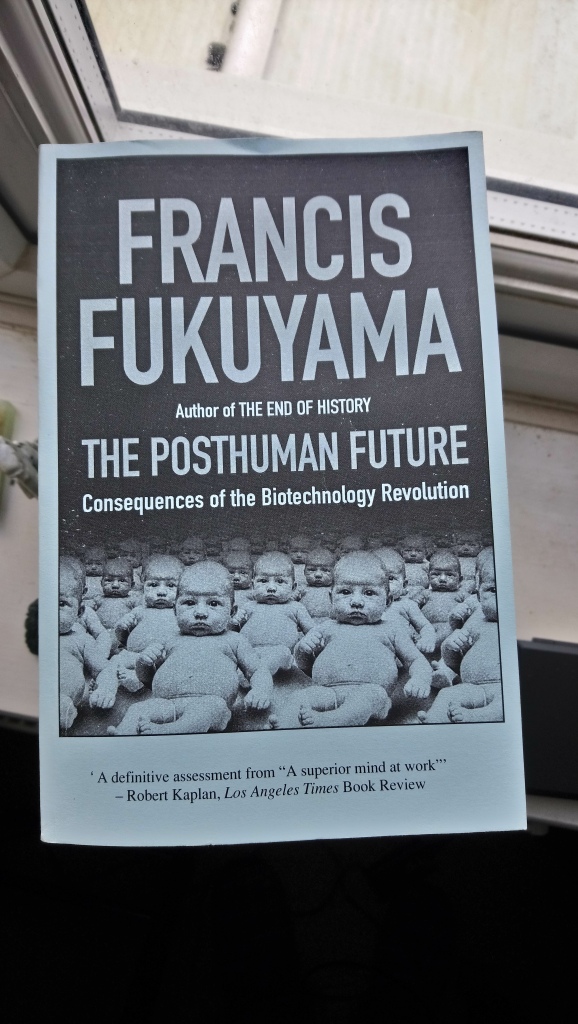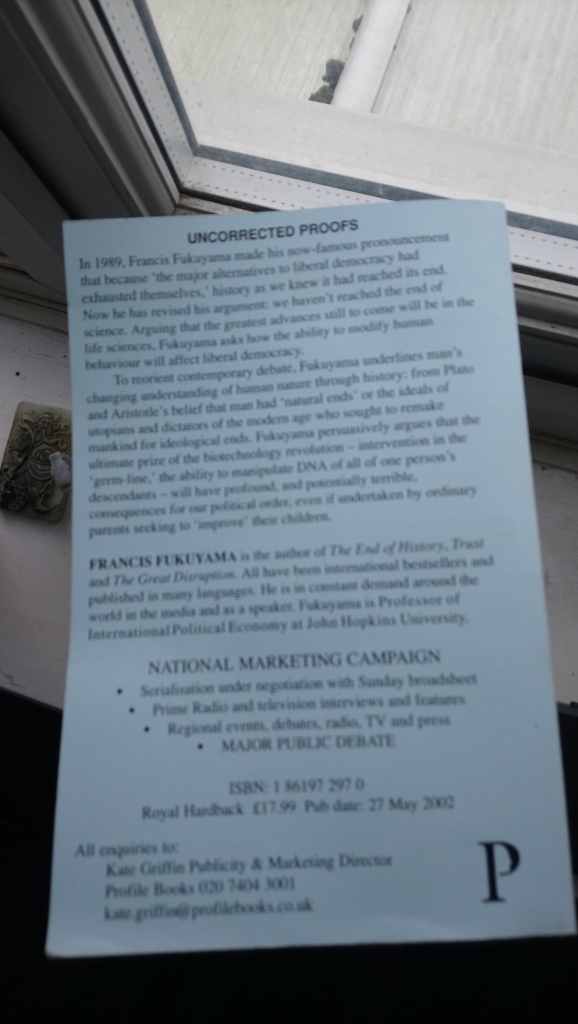Review of Francis Fukuyama’s 2002 bestseller
Not as big a success as his The End of History (1989), nevertheless along with Marilyn Manson this book by Fukuyama helped propel the posthuman movement (1988) more into the mainstream discussion. Nothing much dates as quickly as futurism, and looking at this volume today it is thin on the ground on A1, and a little bit preoccupied with ‘designer children’ pros and cons which maybe was a hot topic 22 years ago, but doesn’t get much current press. My pre-release copy (see photos) is titled “The Posthuman Future”, but overwise doesn’t much differ from first and subsequent editions. Other academics followed Fukuyama onto the bandwagon after this publication, all of them quite far from the 1988 posthumans and the transhuman/ radical futurist movement more generally. Anxieties about the future take over from optimism and inventiveness in this book, in which Fukuyama extensively references early eugenics and various dystopian future scenarios. Extropianism and the discoveries and possibilities offered by MVT/ primal eye (1979) were by contrast markedly much more utopian and positive in tone and scope. ref1

“Our Posthuman Future: Consequences of the Biotechnology Revolution” by Francis Fukuyama delves into the implications of biotechnological advancements on our humanity. Fukuyama raises thought-provoking questions about the intersection of science, ethics, and human nature. Let’s explore some of his key concepts from the book:
Human Nature:
Fukuyama defines human nature as the sum of behaviors and characteristics typical of our species, arising primarily from genetics rather than environmental factors. He emphasizes that distinguishing between “pathological” and “normal” traits is possible and necessary for regulatory purposes. Factor X, representing the irreducible totality of human qualities, forms the foundation of human dignity.
Fukuyama argues that our genetic endowment sets us apart from other creatures and provides a basis for human dignity. I think he is wrong, since all E1 animals (mammals, avia, many reptiles) share all basic cognitive functions with us, REM and dreaming as well as experiences of waking consciousness.
Human Dignity and Biotechnology:
Human dignity rests on qualities like moral choice, language, reason, emotions, sentience, and consciousness. Fukuyama warns against unregulated modification of human germline cells, emphasizing the potential consequences. He considers human embryos to have a higher moral status due to their potential to become full human beings. The debate over creating, cloning, and destroying human embryos is not solely religious; it has broader implications.

Human Rights and Human Nature:
Fukuyama argues that understanding human rights requires acknowledging human nature and dignity.
Classic philosophical accounts by Socrates and Plato support the existence of human nature.
He challenges critics who dismiss these accounts as “simplistic” psychology.
In essence, Fukuyama contends that the biotech revolution may lead us into a “posthuman” future, altering our humanity beyond recognition. The book invites us to reflect on the delicate balance between scientific progress and ethical boundaries. Often he is too respectful of religions and the influence of the underlying Supernatural Theory of Causation that still persists throughout Academia, despite having failed.
If you’re curious, you can explore more in Fukuyama’s book. https://en.wikipedia.org/wiki/Our_Posthuman_Future https://www.theguardian.com/books/2002/jun/01/highereducation https://www.goodreads.com/book/show/196487.Our_Posthuman_Future
